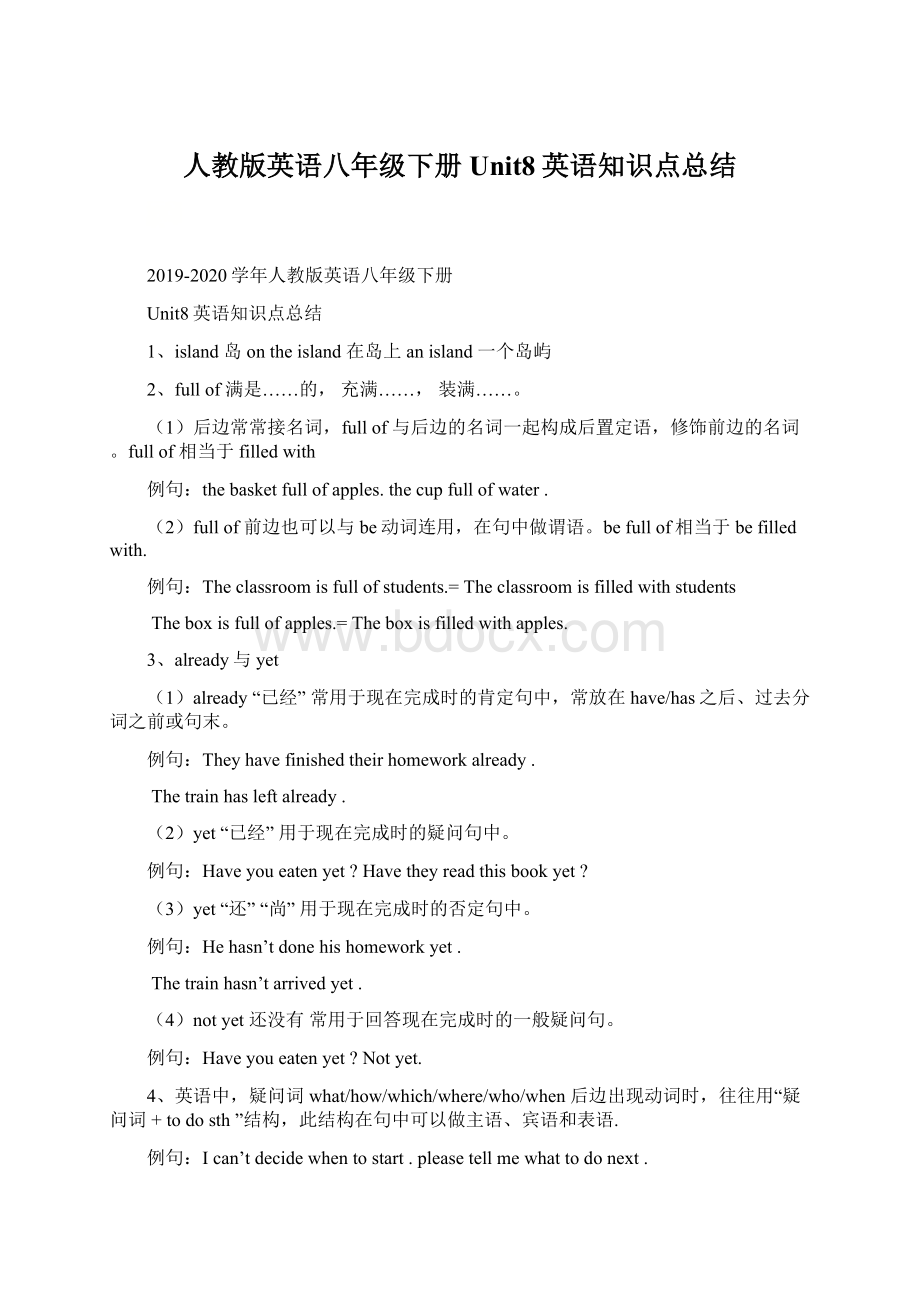人教版英语八年级下册Unit8英语知识点总结Word文档下载推荐.docx
《人教版英语八年级下册Unit8英语知识点总结Word文档下载推荐.docx》由会员分享,可在线阅读,更多相关《人教版英语八年级下册Unit8英语知识点总结Word文档下载推荐.docx(8页珍藏版)》请在冰豆网上搜索。

Hehasn’tdonehishomeworkyet.
Thetrainhasn’tarrivedyet.
(4)notyet还没有常用于回答现在完成时的一般疑问句。
Notyet.
4、英语中,疑问词what/how/which/where/who/when后边出现动词时,往往用“疑问词+todosth”结构,此结构在句中可以做主语、宾语和表语.
Ican’tdecidewhentostart.pleasetellmewhattodonext.
Hedoesn’tknowwheretolive.Doyouknowwhichtobuy?
5、finishdoingsth做完某事
DidyoufinishwatchingTV?
Ihavefinishedcleaningtheroom.
6、putdown放下down是副词,接代词时,代词要放在中间。
Yourbagisveryheavy,pleaseputitdown.
7、page页表示第…页时,用page+数字
page1818页page4242页
8、in+一段时间在……后,常用于一般将来时。
Theywillbebackinthreedays.
after+一段时间在……后,常用于一般过去时。
HewenttoBeijingafterthreedays.
9、cutdown砍倒down是副词,接代词时,代词放中间
例句:
Thetreesareimportant,Don’tcutthemdown.
10、learntodosth学习做某事learnfrom向……学习
Weshouldlearnfromthatboy.
Whendidyoulearntoplaythepiano?
11、else别的其他的常放在疑问词和something/anything/nothing等词的后边。
Whatelsecanyoudo?
Ihavesomethingelsetosay.
12、howlong与howsoon
(1)howlong多长时间常用于对“for+一段时间”或“since+过去的时间点”提问,主要用于一般过去时或现在完成时。
HowlongdidyoustudyEnglish?
IstudiedEnglishfor2years.
Howlonghaveyoulivedhere?
Ihavelivedheresincelastyear.
(2)howsoon多久常用于对“in+一段时间”提问,主要用于一般将来时。
Howsoonwillhebeback?
Hewillbebackintwodays.
13、one……,theother……..(两者之中)一个……,另一个……。
Hehastwosons,oneisadoctor,theotherisaworker.
注意下边的例句:
Hehasfourbooks,oneisaboutChinese,theothers(theotherthree)areaboutEnglish.
14、named是name的过去分词,被命名为…的,名字叫…的,named与后边的名词一起修饰前边的名词。
TheboynamedTomisafriendofmine.
IhaveastudentnamedChongtongyao.
15、inthemiddleof在…中间
inthemiddleoftheroad.inthemiddleoftheriver.
16、can’twaittodosth迫不及待去做某事
Ican’twaittowatchfootballgame.
can’thelpdoingsth情不自禁地做某事
Hecouldn’thelplaughingwhenheheardthenews.
17、abroad在国外到国外abroad是副词,前边不加任何介词。
goabroad去国外
18、million百万同hundred(百)、thousand(千)的用法相同。
(1)表示具体数字时,用“基数词+million+名词复数”。
twomilliondollarseightmillionsoldiers
(2)表示不确定的数字时,用“millionsof+名词复数”“数百万的…”
millionsofbooksmillionsofpeople
19、introducesbtosb向某人介绍某人
Iintroducedmyparentstomyfriendsyesterday.
introducedoneselftosb向某人作自我介绍
Canyouintroduceyourselftous?
20、belongto属于后接名词或代词宾格。
ThisbookbelongstoTom.Thehousebelongstohim.
21、Whatdoyouthinkof…?
=Howdoyoulike…?
你认为(觉得)…怎么样?
用来询问某人对某事的看法。
Whatdoyouthinkofthisfilm?
It’sgreat.
22、attheendof….在…终点(尽头),在…末
Wewillhaveaspeechcontestattheendofthismonth.
Youcanfindahospitalattheendofthestreet.
23、anumberof和thenumberof
(1)anumberof许多相当于many,修饰可数名词复数。
Anumberofstudentsareplayinggames.
(2)thenumberof….…的数量(数字)做主语时,谓语用单数。
Thenumberofthestudentsinourschoolis600.
24、mustbe一定是(在)准是(在)表示对事物的判断或推测。
Hemustbeournewteacher.Tommustbeathome.
maybe可能是(在)也许是(在)
HemaybeTom’sbrother.Shemaybeinthehospital.
can’tbe不可能是(在)
Hecan’tbeathome.
一般情况下,把含有mustbe的句子变成否定句时,把mustbe改成can’tbe.
25、sound(听起来),look(看起来),smell(闻起来),taste(尝起来),feel(感觉)等联系动词在句中做谓语时,后便常常接形容词作表语。
Yourideasoundsright.Helooksyoung.
Thefoodsmellsgood.Ifeelexcited.
soundlike听起来像
Thatsoundslikeagoodway.
26、Keepinghealthyisimportant.英语中,动词一般不能做主语,动名词(动词后加ing)可以做主语。
动名词做主语时,谓语动词用单数。
Playingbasketballismyhobby.
27、usedto+动词原形过去常常做某事
be(get)usedto+名词、动名词或代词习惯于
Heusedtogetupearly.Heisusedtogettingupearly.
28、hope希望
(1)hopetodosth希望做某事Ihopetogoabroad.
(2)hope+从句希望某人做某事
IhopeyoucanhelpmewithmyEnglish.
29、ontheradio通过收音机onthecomputer通过电脑
onthephone通过电话onTV通过电视
30、cometorealize逐渐意识到
HecametorealizeMrwangwasagoodteacher.
31、allof+不可数名词、名词复数或代词宾格所有的…
allofthemalloftheworkersallofwater
32、kind
(1)种类
akindof….一种…Anappleisakindoffruit.
allkindsof…..各种各样的…allkindsofbooks
differentkindsof…不同种类的…differentkindsofbooks
kindof有几分有点Iamkindofhungry.
(2)和蔼的仁慈的bekindtosb对某人和蔼(友好)
Sheisverykindtous.
33、east东south南west西north北
southeast东南northeast东北southwest西南northwest西北
eastern东方的southern南方的western西方的northern北方的
southeastern东南方的northeastern东北方的southwestern西南方的northwestern西北方的
34、suchas例如用来列举整体之中的部分同类人或事物,suchas之前一般用逗号与主句隔开,后边直接接名词或名词性短语。
Ihavelotsofhobbies,suchasreadingandsinging.
35、It’s+形容词或名词+forsbtodosth.对某人来说做某事是…。
It’snotagoodideatocopyothers’homework.
It’simportantforustolistentotheteacher.
36、dosomeresearchon做一些关于…的研究
Heisdoingsomeresearchonphysics.
37、oneday(有)一天可以指过去,也可以指将来
Oneday,ImetTomintheshop.
Yourdreamwillcometrueoneday.
38、bringback带回
WhatdidyoubringbackwhenyoucamebackfromAmerica?
39、hurryup赶快onthesand在沙子上growup长大
gotothemovies/seethefilm看电影thinkabout考虑
atleast至少fulloffeelings充满感情abrokenship一艘坏船
eachother/oneanother彼此notlongafterthat那之后不久
40、eversincethen自从那时起常用于现在完成时
Eversincethen,Wehavebeengoodfriends.
41、fightover(about)因为……争吵(争斗)
42、beinterestedin+名词、动名词或代词对……感兴趣
Heisinterestedinsports.I’minterestedinplayingfootball.
43、theimportanceof…………的重要性
Doyouknowtheimportanceofthecomputer?
41、现在完成时。
(1)概念或用法:
a、表示过去发生或已经完成的某一动作对现在造成的影响或结果。
例:
Shehasfinishedherhomework。
b、表示过去已经开始,一直持续到现在的动作或状态,往往和“for+一段时间”或“since+过去的时间点或一般过去时的句子”连用。
这种用法中,谓语动词多是延续性动词。
Wehaveknowneachotherfor20years.
Ihavelivedheresince1985(sinceIwasborn)
(2)构成:
have(has)+动词的过去分词。
(3)句式:
肯定句:
主语+have(has)+动词的过去分词+……。
否定句:
主语+have(has)+not+动词的过去分词+……。
疑问句:
Have(Has)+主语+动词的过去分词+……?
肯定回答:
Yes,主语+have(has)。
否定回答:
No,主语+haven’t(hasn’t)。
Shehaslearnedtensongsalready.Haveyouseenthefilmyet?
Yes,Ihave.(No,Ihaven’t.)
(4)动词过去分词的变化规则:
a、一般情况下,动词词尾加ed;
以e结尾的直接加d;
b、以“辅音字母+y”结尾的单词,把y变成i后加ed;
c、个别单词双写最后一个字母后加ed;
d、不规则动词参见“不规则动词表”。
(5)在现在完成时的用法b中,“表示过去已经开始,持续到现在的动作或状态”。
此时谓语动词必须是延续性动词。
因此某些暂短性动词在此用法中需要转换成延续性动词。
常见的有:
buy→haveborrow→keepdie→bedeaddie→bedeadleave→beaway(from)start(begin)→beoncome(go)→bein(at)join→bea……membergoout→beout
Thedoghasdied.
Thedoghasbeendeadforaweek.
Tomhasboughttwopens.
Tomhashadtwopensforamonth.
Themeetinghasbegun.
Themeetinghasbeenonfortwohours.
Hehasborrowedtwobooks
Hehaskeptthebooksfortwoweeks.
(6)have(has)beento+地点表示“去过某地”。
have(has)goneto+地点表示“到……去了”。
have(has)beenin+地点表示“在某地呆多长时间”。
TheyhavegonetoLondon.
IhavebeentoShanghai.
HehasbeeninBeijingfortenyears.
(6)与现在完成时连用的词或短语。
already(“已经”,用于肯定句),yet(“已经”,用于疑问句、“还”,用于否定句),just(刚刚),ever(曾经),never(从来没有),sofar(到目前为止),inthepast(last)+一段时间(在过去的……),before(以前放在句末),“for+一段时间”,“since+过去时的句子或过去的时间点”,‘since+一段时间+ago”,答语是“Notyet”(还没有)时,它的问句是现在完成时。
Once(一次)、twice(两次)、threetimes(三次)等。
HaveyoueverbeentoBeijing?
No,never.
Theyhavelearned300wordssofar.
Ihaveneverseenhimbefore.
Hehasvisitedthezootwice.
Shehasmademoreprogressinthepasttwoyears.
Theyhavelivedherefortenyears.
Thetrainhasjustlefthere.